|
The windows in the castle walls - stone arches, really - were wide
enough to place a crossbow. There was no glass, thus allowing bow-shot
at enemies without. But against the cold alpine winter thick woollen
tapestries had been placed against the arches - tapestries which could
be quickly pulled down if an enemy army advanced. But no army would
advance until More had sent the Duke the pre-agreed signal.
Standing behind the blanket of wool More armed the crossbow and wedged
it in place. He then began carefully counting down from 300 in his mind
as he ducked from under the tapestry and gave Tamina the signal.
She darted into the nearby study then sprang back as Calvin and three
guards emerged, running towards the pair. A tortoiseshell cat also came
from the room but strode in the opposite direction, tail raised high in
dudgeon.
May he gloat first, thought More to himself, 260, 259.
"How could you abandon humanism, Monsieur Calvin?" asked Tamina quickly.
"Before I kill you and your beau, Mademoiselle Spalatine," Calvin
announced, answering More's unvoiced prayer, "Let me tell you why what I
do is the logical consequence of humanism. For after all, what did any
in our order seek but power?"
"Nay, we sought knowledge," Tamina refuted him hotly.
"And after such knowledge?" asked the Frenchman, "We do not seek
knowledge for knowledge's sake, as the effete Greeks did, but as
purposeful learning.
"But in this dispensation power lies in the hands of princes. Even the
papacy is in the hands of the noble Italian families.[1] For one such
as I to gain real power there needs must be a revolution."
165, thought More as he said, "But why Protestantism? Isn't the reason
and love of humanism revolutionary enough?"
Calvin sneered, "Reason and love are well enough in their place but what
good are they when you ask a soldier to die for you at an ambuscade?
No. You must offer him eternal life, or better yet frighten him with
eternal damnation. Revolution comes from stark choices. There will
never be a revolt of the moderates. If I am to take over the world I
need Protestantism, not humanism. And not just any Protestantism, not
the milk-sop humanism-infested Protestantism of Luther. I need my own
Protestantism," the glint in Calvin's eye became madder, "I need
Calvinism!"
The 'Bwa-ha-ha-ha' laugh came just as the count became 60. More's plan
was progressing better than he dared hope. It was time to enter the
end-game.
"You'll never get away with this, Calvin" More declared.
"Oh yes I will. And you and Mlle Spalatine will not stop me for you
will be dead. No drawn out torture but instant death. Now! Guards,
cut them down!"
The three men drew their swords and advanced on Tamina and More.
Three, two, one. Twang! Twang! Twang!
The guards lay dead. Tamina and More each grabbed a sword and sprang at
Calvin.
But he was gone. There was a snick coming from behind the wooden
panelling of the inner wall of the corridor.
"A secret door. And he's bolted it!" declared Tamina.
More retrieved his compound crossbow and reloaded. "Stand back!" he
commanded, before shooting thrice against the lock.
Now, by throwing his weight forward, the door opened, revealing a dimly
lit passage. There was no sign of Calvin.
"He has escaped," Tamina said simply.
"Sadly, yes," said More, "But with him gone we can now signal Charles."
| 
